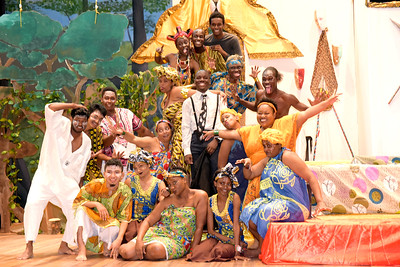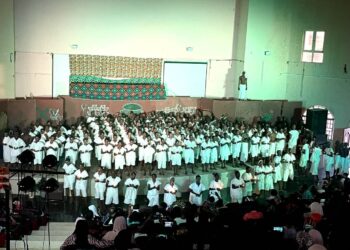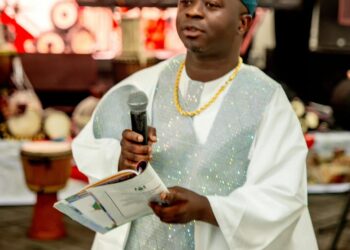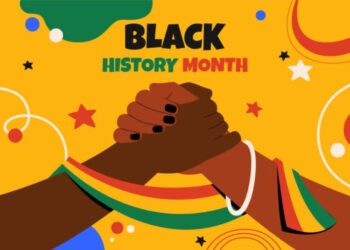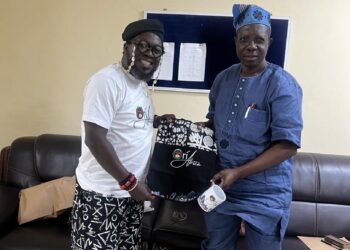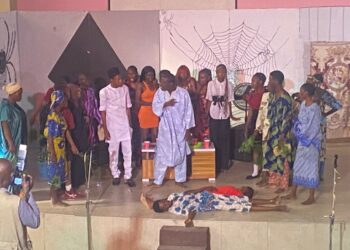By Tunji Solomon
BEYOND THE metaphoric contexts of Wole Soyinka’s classic play: The Lion and The Jewel; lies the echo of his gimmick and subtle literary tools to humble the powerful, ignore the ignorant and exhausts the wits of the wise. Between 1959 when the play first landed on the Nigerian theatre stage, and 2025 – when modernity envelopes every thing we know about art and what art is not; little has changed, if at all, anything has changed!

FROM THE plot to setting, the playwright did not mince words, coupled with the directorial concept of Ogundipe Hussein’s tons of humours let loose upon the audience. The tone of innuendos are tuned down, metaphors walk naked and in solitary confinement, similes are inevitably unveiled. The playwright knows where he wants us to be in his thematic projection.
TO BEGIN with, Ilujinle, a village closed to Stone Age era and far from modernization, ushers-in the cleavage between tradition and civilization; where, like The Lord of the Rings (in which the trilogy specifically revels in the adventure and fantasy as depicted in the novel by the English author: J.R.R. Tolkien); we reign and assume to be moving forward through the western education that makes our culture looks inferior. Thus, embrace derogatory treatment of our culture and tradition, consciously and unconsciously. Though such journey usually produces the opposite results. There are historical evidences.
IT IS a pleasure to be back to Ilujinle once again and the world of Sidi (Adesiyan Rodiat) – the metaphorical coveted prize every man wants to win. Sidi, like the local champion within the contemporary village setting, unlike the famous Funke Akindele’s coined eponymous character: Jenifa; is the village local beauty, the “Belle” and the “jewel”: whose beauty ravages two suitors, who become restless and look for her hand in marriage. Her strength lies so much in her beauty, less in her wit, but cunningness. An unspoken depiction of modern Gen Z – who loves reel than to be real.
TO THOSE who love to run away or manipulate the usual, ideal and noble paths on social issues, you are Lakunle (Okeowo Boluwatife /Ogunsina Feranmi). Lakunle is an acclaimed, westernized, and arrogant school teacher. He lives in his own world of wits and manipulation. Lakunle is more than symbolic representation of those who twist laws and order of the day, to fit their plans. They are the enemies of the State. In Soyinka’s context, self-made enemies of tradition and culture.
IN-BETWEEN, Sadiku, the intermediary between Sidi and Baroka, delivers the rejection message from Sidi to Baroka with mixed feelings. Baroka doubts the authenticity of the feedback. Trust issue ensues because Baale of Ilujinle believes, like all women, Sadiku does not want another woman as rival. The way of the women? Smiles.
THE COALITION of Sidi and Sadiku sudden conspiracy against men’s world emerges from nowhere as Lakunle’s shows up to give hope to his ambition of winning the heart of Sidi. With stern look towards Lakunle from Sadiku, “We will deal with you like Baroka. Welcome to the world of women”, says Sadiku. Though Sadiku admits: “Baroka ki ise eran riro ooo” (meaning: Baroka is not an easy person to deal with).
THERE ARE many Lakunles in our society today – who seek many Sidi’s hands in marriage, and refuse to honour the dowry, the traditionally required bride price, and other miscellaneous. No wonder, we see how civilization erodes the embedded values in traditional marriage untamed. Things cannot but fall apart, when the centre of traditional values and cultural norms cannot hold; the falcon cannot hear the falconer. Apologies to William B. Yeats.
MOREOVER, LAKUNLE, while being educated and civilised, he was culturally ignorant (may be as a pretence and what the playwright wants us to believe?); to succinctly reflect Oscar Wilde’s timeless statement: “Ignorant citizens cannot make wise decisions”. He aptly captures the content of character of a ‘westernised’ mind.
FURTHERMORE, LIKE many sons of Biblical Adam and Eve, they always invent words for what they loathe to reference, or honour. There is typical Lakunle in every modern Nigerian man. Lakunle cannot but coin words to soothe his nerves and veins, when he says: ”barbaric, outdated, and unaccustomed” – the demeaning words deployed against traditional marriage requirements. There are scores of Lakunle in churches and mosques. They are ubiquitous in our society.
LIKE WORDS and their opposites, there are equally Baroka (Abdullazeez Jamie/Muritadoh Abdulqudus) who dotted our territory and geographical space like sands; who love to embrace wisdom where ignorance reigns; who love to do what is civil and cultured. The Barokas always embrace wits to get things done. Baroka, is not just a traditional ruler of Ilujinle; he remains an older “Lion” with instinct that revels in cunning moves. He knows his onion.
Eventually, Baroka applies native intelligence, wits and charisma to get Sidi’s hand in marriage. He is an opportunist. Confident boost for him, comfort for her. There is always a way out of every situation, Baroka shows us in a subtle and cunning manner he defiles Sidi in his palace – a sort of unpronounced sacrilege. There is always a way to get a dream realised, Baroka proves it. As John Updike once said: “Dreams always come true, if not for that possibility, nature will not incite us to have them”.
TO BUTTRESS the foregoing, Baroka ably captures the mood and tone of tradition; when he embraces Yoruba wisdom to lead, administrate and fulfil his personal desires. Closely, Lakunle offers symbolism and represents modernity and western culture with its continuity and subtle tools with which it ridicules the Yoruba culture, customs and traditions. He lost in his bids to get Sidi as a wife. “You cannot survive honeymoon”, Sidi breaks the heart Lakunle as she offers him the invitation card to attend her wedding with Baroka, despite being subtly violated by the latter. Dejected and forlorn, Lakunle looks hopeless as the drama comes an end with one of the Yoruba age-long song:
“Ori iya re a bun e lomo,
Esuru ki i ya agan ooo”.
THE THEME of conflict in Soyinka’s The Lion and the Jewel is a constant reminder of clash of interest between tradition and civilization. A lot is hidden, yet, obvious in Soyinka’s Lion and the Jewel. That is the joy obtainable within the literary world. Come and sip.
OTHER SIMILAR literary works but different genre that share same theme however with different characters, are: Chinua Achebe’s Things Fall Apart, No Longer at Ease, and Arrow of God (his 3rd novel, published in 1964) – are the famous African Trilogy that aptly offer closely related focus and settings. Similarly, the timeless poem: Stanley Meets Mutesa by David Rubadiri; interplays with the theme of tradition and modernity.
REMARKABLY, THE endless ingenuity of 1986 Nobel Laureate winner, cannot but awe us the more, through his innocuous christening of the characters and their roles, his literary works will continue to exceed expectations for those who appreciate works of art. Prof. Wole Soyinka’s timeless reminder of ease with which human beings easily forget their source and copycat the outside culture, cannot be more timely than now: when and where lust after foreign culture and tastes have left us vulnerable, and susceptible, to the whims and caprices of foreign dominance, in many forms, in many ways. There is no trajectory of our lives that have not been affected by such external perforated touches.
LIKE Lakunle and Baroka in every one of us, the individual entity would continue to exist in a polarised and distorted society like ours – where neither Baroka becomes better but conservative, nor Lakunle remains significant, but existing, rather than living. There is always a twist.
MANY thanks to the impactful leadership of the Faculty of Art and Social Sciences (FASS) ably led by the Dean, Prof. Temisan Ebijuwa, and the Head, Department of Theatre Arts, Ladoke Akintola University of Technology, (LAUTECH), Ogbomoso, Prof. Taiwo Oloruntoba-Oju. The apt usage of freezing as parts of the directorial concepts, with plurality of Nigerian musics of many colours and shapes from the orchestra, with rhyths and beats from drummers, the noon was refreshed till evening walked in. This present 100 Theatre Workshop remains outstanding with every production. The sky is not their limit. They have wings to go places!
See you again.🤪
You can get every of our news as soon as they drop on WhatsApp ...To get all news updates, Join our WhatsApp Group (Click Here)

